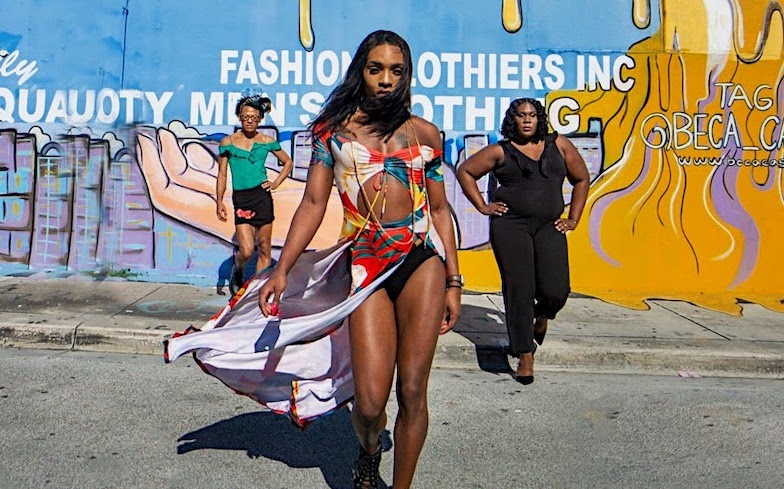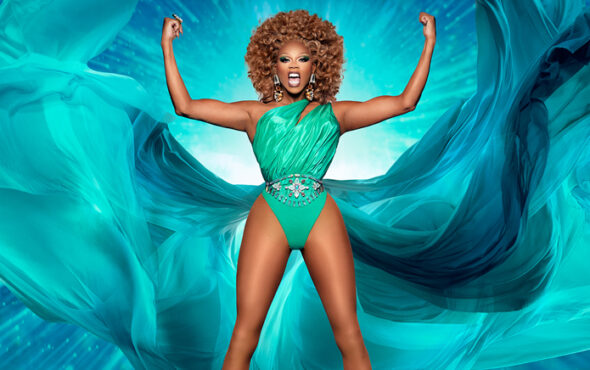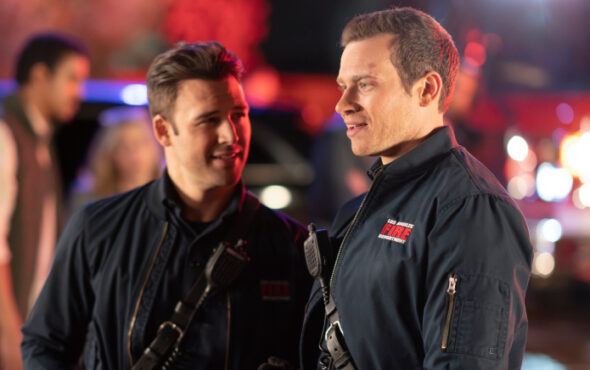
To mark Trans Day of Visibility earlier this year, Octavia Yearwood created YouTube docu-series The Tranz Form, which offers an eye-opening look into the trans experience.
The artist, curator, and author teamed up with director and executive producer Carrie Choe (1106 Productions) to showcase narratives and perspectives of trans people whose voices often go unheard in mainstream media.
The Tranz Form focuses on the lives of Brielle Roundtree, Elle Williams and Xiara James, three Miami-based Black trans women who navigate a world in which they are at a disproportionate risk of violence and harassment because of their identity.
With trans people – especially Black trans women – losing their lives around the world every single day due to intolerance and bigotry, a docu-series that highlights the voices of the community has never been needed more.
“In 2019, there were 26 recorded killings of Black trans womxn. One of those womxn was Kiki Fantroy, in my backyard in Miami. That was the tipping point for me,” Octavia tells GAY TIMES of how the series came to fruition.
“I’ve been an educator for almost 20 years, so my mind automatically went to, ‘How can I help educate people, help humanise people of this experience? I wanted to create something that could save a life but also add equity.”
Brielle adds: “We have to implement protections for LGBTQ+ folks around the country, more specifically the focus on gender identity, and we have to create opportunities to support these marginalised communities to living happier and healthier lives.”
We spoke with creator and producer Octavia, director and producer Carrie and star Brielle to discuss the importance of trans perspectives in media, and how white cisgender people can be better allies to the trans and Black communities.
How did The Tranz From come to fruition?
Octavia: As a queer person of colour, I’d be occupying spaces with the community, and every time a murder happened I’d watch room after room of our people mourning. In 2019, there were 26 recorded killings of Black trans womxn. One of those womxn was Kiki Fantroy, in my backyard in Miami. That was the tipping point for me. I’ve been an educator for almost 20 years, so my mind automatically went to, ‘How can I help educate people, help humanise people of this experience, and make sure that they are at the forefront?’ I wanted to create something that could save a life but also add equity. I decided that they needed to be seen and heard in motion, so I went to my friend TéQuan who I knew played around with creating video content, and asked if they would be interested in helping me. We put out a public call for trans womxn to be featured in season one of The Tranz Form. I later found director Carrie Choe to come on board, and we all made it happen.
How important is to learn about the narratives and perspectives of trans people that aren’t seen in mainstream media?
Brielle: I think it’s critical to the lives of trans people. We aren’t invincible and our lives have greater meanings than the over-sexualised narratives folks share. We have purpose.
Octavia: It’s paramount because the trans experience is extremely layered and laced in abuse. If the world continues to reduce real lives into entertainment, how are you not saying these lives aren’t real and don’t matter? If all you see are a handful of folks you identify with being celebrities but you barely feel seen, how do you feel safe? Real life narratives and perspectives of the trans experience by trans people are important for both relatability and understanding. Lastly, I’ll say that it is also very important for people to stop making everything about sex and sexuality, and to understand that, not only is it not your business, but also not what any of this is about. Trans folks need to be uplifted in a real way, period.
Carrie: Its very important for trans folks to have as much control of their narrative as possible. For the most part, the conversation surrounding trans folks in the mainstream media and even “culture media” such as popular social media blogs is extremely narrow and laced with bigotry. Often times, the people who lead these conversations have little to no understanding of the trans experience and that leads to all of the very ignorant dialogue that we often see and hear.

What has the response been like to the documentary?
Octavia: The feedback has been overwhelmingly great! I worked really hard to make sure not only trans folks watched the series. I sent it to cishet male and female friends, old and young! I was very surprised at how enlightened people felt. A lot told me they loved the show because it created a safe space for them to learn and exchange dialogue with themselves on their views and ideas. Elle and Brielle have both said they receive DM’s daily from all types of folks sharing how inspired and impacted they are. If the world didn’t shut, we would have had screenings se -up at the Soho Beach House in Miami, The Riveter with House of Rebirth in Texas, and New Orleans was in the works too. I know it would be even more amazing for the gworls if we were able to get in front of more people.
Brielle: I’ve been shown an incredible amount of love and support from viewers. I think The Tranz Form gave people courage to challenge ideologies that maybe they cared less to challenge before. Trans people are people and we deserve to be treated equally. I’ve taken the time to respond to every person who’s spent time to let me know how I’ve impacted their lives. It’s important to give that love life.
Carrie: One of my really good Black conservative friends called me and said she watched all six episodes and was “so surprised” by how much she enjoyed it. And at some point she wasn’t conscious that she watching a show about trans folks. It was a show about people. And thats major because all of us want that; to be seen for who we are, not the labels placed upon us.

What would you say are some of the biggest challenges trans people, especially trans people of colour, face living in a Tr*mp America?
Brielle: Access to employment, housing and adequate medical care. We are barely given the opportunity to live our authentic lives.
Octavia: I am not a trans-identified person so I cannot answer what their biggest challenges are. What I can say is this is a global issue, because it seems a lot of the world hates Black skin – especially if it’s on a queer body.
Trans people are being regularly attacked and killed in the United States, most of whom are Black trans women. Why is this happening? What can we do to prevent this?
Octavia: It’s everywhere. This is why we put The Tranz Form on YouTube, so it can be viewed globally. Prevention… Listen, when you cause harm it’s clear that you are in conflict with yourself, so healing is number one. I think as a community, we need to hold people accountable for causing harm and intentionally work to support the harmed. You can’t give a slap on the wrist and tell the person harmed to get over it. What is also happening is abandonment, kicking out, disowning, and abuse with no level of support when they confront this cold world. We need a lot of programming and funding to support building the efficacy of trans folks, making sure they have safe shelter and giving them opportunities to thrive. This is where the teamwork needs to increase because no one person or group can do it alone.
Brielle: We live in a capitalistic society where misogyny and patriarchy dominates. We have to implement protections for LGBTQ+ folks around the country, more specifically the focus on gender identity, and we have to create opportunities to support these marginalised communities to living happier and healthier lives.
Carrie: Social programming has conditioned us to either “fantasise or fear” trans folks, and that coupled with decades and decades of Black men’s masculinity being weaponised and brutalised in America is a big reason for the state of violence. I point out Black, cis, straight men because I believe a lot of the violence against Black trans womxn come at the hand of Black cis men. I believe Black, cis, straight men are fearful of losing their masculinity and so they attack out of fear, fear of being considered gay. Fear of being attracted to or connecting with someone that challenges the traditional understanding of femininity and masculinity. Fear that comes from a severe misunderstanding of trans folks. We are taught hate and fear. It is not something we are born with. This fear is a result of the anti-trans rhetoric that is in most of our mainstream media. The Tranz Form is media that we hope will transform the narrative and “deprogram” the hate and fear.

How can allies, especially cisgendered white people, do their part in aiding the trans community? How can they step up?
Octavia: First, go watch the show and learn yourself. It depends on what way you are stepping up, but I would say first see what is needed and then ask how you can support and show up. No one can answer this question better than whoever you are looking to support. Communication is a major ally key, it’s never the move to try to come in saying what you’re going to do, or even what you want to do. I am not saying that if you have opportunities to offer you can’t, I’m saying ask what is needed first. Lastly, just check your privilege. This is just for your sake, because us queers are woke and spicy.
Brielle: Understand that we don’t want a saviour, so don’t attempt to provide a way for us. Teach us the way so that we can have equity. My grandma always said, ‘Buy a man a fish, you feed him for a day. Teach a man to fish, you feed him for the rest of his life.’
Carrie: Any person with privilege has a social responsibility to reach back and push forward. I find a lot of people don’t know how to “step up and reach back” because they aren’t aware or realistic about their privilege. They aren’t honest about where they are on the social food chain. As a cis womxn, I looked at an issue in the trans community – no control of their narrative. I’m privileged to be able to afford a camera, editing computer and a skill in filmmaking and storytelling. I can use what I got and create a space for them. You may not have all the answers or tools, but if you really want to help, if you really want to create change in your community, then take a step and trust that for every step you take, the universe will take three for you. Often times, people want a convenient roadmap and step by step guide for how to be an ally. I wasn’t “trying” to be an ally. I didn’t even know the definition of ally at one point. I just wanted to genuinely help shift the narrative for my sisters in the Black community. I hope that after watching The Tranz Form folks are like, ‘Wow, I really want to help the trans community’ and their next question is, ‘What can I do?’ And my answer to anyone is, ‘If you really want to change the world for the better, you look at yourself and your privilege and share it.’ Everyone has privilege, and trans people want the same things we want. They just have a longer road to get the same equity.
All of this violence rarely gets reported by mainstream news outlets – does the media has a responsibility to speak out about this discrimination?
Octavia: I think if the media is going to cover harm being caused, they should also share how the world can support the harmed people. They also have the responsibility to talk about something that is an epidemic, and the killing of Black trans womxn is one. Thinking about this makes my head spin because a lot of this cant even be addressed if we don’t address the entire system first, then start to make these changes. The media and people causing harm do what they do because that’s what the system says it is ‘alright’.
Brielle: I think media has a responsibility to share both sides of any experience – good and bad news. I hope that one day we deem this important because it’s our responsibility to educate ourselves and those who know and love us.
Carrie: Yes. It helps tremendously. Brielle touched on that on episode two when she talked about how the little coverage her family saw on deaths in the trans community. It really affected her family and opened the door to some important conversations.
Can we expect another season of The Tranz Form?
Octavia: Yes! If we can get picked up by a network to really let this thang run. My vision is to uplift the entire trans spectrum. People think being trans is about sexuality or that it is just the binary of male and female and that’s just not facts! There is a beautiful array of folks of all ages who deserve to share their experience with the world, be seen, be loved, be appreciated, supported and just all the things! Aye Dwyane Wade, let’s catch a vibe to talk about you getting this executive producer credit real quick!
You can watch the first six episodes of The Tranz Form now on YouTube (or below).



